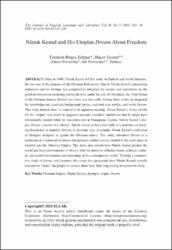| dc.contributor.author | Edman, Timuçin Buğra | en_US |
| dc.contributor.author | Gözen, Hacer | en_US |
| dc.date.accessioned | 2022-05-20T13:15:25Z | |
| dc.date.available | 2022-05-20T13:15:25Z | |
| dc.date.issued | 2021 | |
| dc.identifier.citation | Edman, T. B. & Gözen, H. (2021). Nâmık Kemal and his utopian dream about freedom. Journal of English Language and Literature, 67(2), 213-238. doi:10.15794/jell.2021.67.2.001 | en_US |
| dc.identifier.issn | 1016-2283 | |
| dc.identifier.uri | https://hdl.handle.net/11729/4344 | |
| dc.identifier.uri | http://dx.doi.org/10.15794/jell.2021.67.2.001 | |
| dc.description.abstract | Born in 1840, Nâmık Kemal left his mark on Turkish and world literature. He was one of the pioneers of the Ottoman Reform era. Due to Nâmık Kemal's pioneering endeavors and his writings that purported to enlighten the society and expostulate on the political descension occurring during his time under the rule of Abdulaziz, the 32nd Sultan of the Ottoman Empire, Kemal was twice sent into exile. During these exiles, he deepened his knowledge and academic background further, explored new worlds, and wrote Dream. This study deduces how, in contrast to its apparent meaning, Nâmık Kemal's choice of title for his “utopia” was meant to suggest a sarcastic condition, indeed one that he might have intentionally created while he was ostracized in Famagusta, Cyprus. Nâmık Kemal's utopia, Dream, consists of a “dream” that he claims to have had while in a mansion overlooking Bosphorus in Istanbul. Dream, in an ironic way, is actually Nâmık Kemal's collection of thoughts designed to agitate the Ottoman nation. This study subsumes Dream as a euchronia or a homotopical utopia that portrays a better society created in the same place in Istanbul and the Ottoman Empire. The study also reveals how Nâmık Kemal posited the social and local environments in Dream with the intent to influence future political, cultural, and social connotations and reasoning in his contemporary world. Through a comparative study of history and literature, this essay thus propounds how Nâmık Kemal actually intended to “shake” the people to awaken them from their long-lasting irresponsible sleep. | en_US |
| dc.language.iso | eng | en_US |
| dc.publisher | English Language and Literature Association of Korea | en_US |
| dc.relation.isversionof | 10.15794/jell.2021.67.2.001 | |
| dc.rights | info:eu-repo/semantics/closedAccess | en_US |
| dc.subject | Dream | en_US |
| dc.subject | Dystopia | en_US |
| dc.subject | Nâmık Kemal | en_US |
| dc.subject | Ottoman Empire | en_US |
| dc.subject | Utopia | en_US |
| dc.subject | Introduction | en_US |
| dc.subject | Utopian impulse | en_US |
| dc.subject | Ernst Bloch | en_US |
| dc.title | Nâmık Kemal and his utopian dream about freedom | en_US |
| dc.type | article | en_US |
| dc.description.version | Publisher's Version | en_US |
| dc.relation.journal | Journal of English Language and Literature | en_US |
| dc.contributor.department | Işık Üniversitesi, Yabancı Diller Okulu | en_US |
| dc.contributor.department | Işık University, School of Foreign Languages | en_US |
| dc.contributor.authorID | 0000-0001-5013-7804 | |
| dc.identifier.volume | 67 | |
| dc.identifier.issue | 2 | |
| dc.identifier.startpage | 213 | |
| dc.identifier.endpage | 238 | |
| dc.peerreviewed | Yes | en_US |
| dc.publicationstatus | Published | en_US |
| dc.relation.publicationcategory | Makale - Uluslararası Hakemli Dergi - Kurum Öğretim Elemanı | en_US |
| dc.contributor.institutionauthor | Gözen, Hacer | en_US |


















